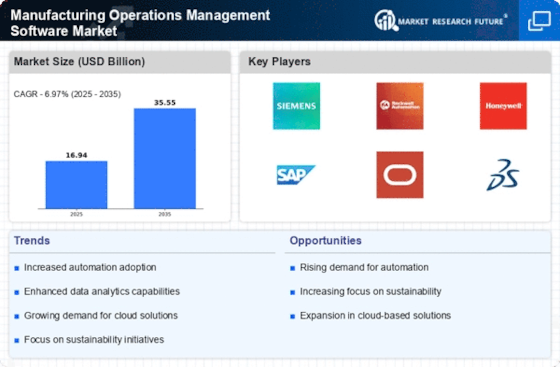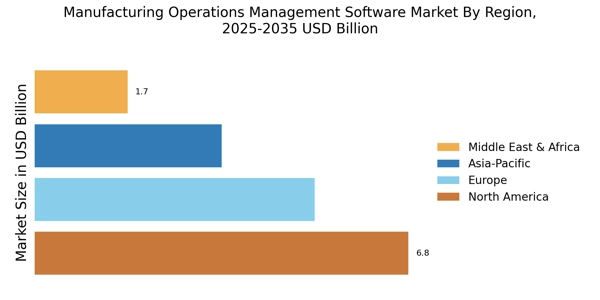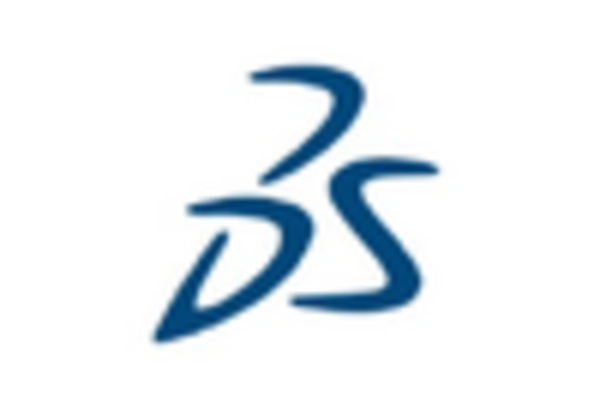Adoption of Industry 4.0 Practices
The transition towards Industry 4.0 is significantly influencing the Manufacturing Operations Management Software Market. As manufacturers embrace smart technologies, the demand for software that supports automation, data exchange, and IoT integration is on the rise. This shift is expected to drive the market, with projections indicating a compound annual growth rate of over 15% in the coming years. The ability to connect machines, systems, and processes through advanced software solutions enhances operational visibility and responsiveness. Moreover, the Manufacturing Operations Management Software Market is likely to benefit from the increasing need for predictive maintenance and real-time analytics, which are essential components of Industry 4.0.
Increased Focus on Quality Control
Quality control remains a pivotal concern within the Manufacturing Operations Management Software Market. Manufacturers are increasingly recognizing the importance of maintaining high-quality standards to meet customer expectations and regulatory requirements. The implementation of advanced software solutions facilitates rigorous quality assurance processes, enabling real-time tracking of production metrics. Data indicates that organizations utilizing these software tools can reduce defect rates by as much as 25%. This focus on quality not only enhances customer satisfaction but also reduces costs associated with rework and returns. Consequently, the Manufacturing Operations Management Software Market is poised for growth as companies invest in technologies that bolster their quality control measures.
Rising Demand for Operational Efficiency
The Manufacturing Operations Management Software Market is experiencing a notable surge in demand for operational efficiency. As manufacturers strive to optimize their processes, the adoption of software solutions that streamline operations becomes paramount. According to recent data, companies that implement such software can achieve up to a 30% reduction in operational costs. This trend is driven by the need to enhance productivity and minimize waste, which are critical in a competitive landscape. Furthermore, the integration of real-time monitoring and reporting features in these software solutions allows manufacturers to make informed decisions swiftly, thereby improving overall efficiency. As a result, the Manufacturing Operations Management Software Market is likely to witness sustained growth as organizations prioritize efficiency in their operations.
Regulatory Compliance and Risk Management
Regulatory compliance is a critical driver within the Manufacturing Operations Management Software Market. As industries face stringent regulations, the need for software that ensures compliance with safety, environmental, and quality standards becomes essential. Manufacturers are increasingly adopting software solutions that provide comprehensive risk management features, enabling them to identify and mitigate potential compliance issues proactively. Data suggests that companies utilizing such software can reduce compliance-related costs by up to 20%. This focus on regulatory adherence not only protects organizations from potential fines but also enhances their reputation in the market. Thus, the Manufacturing Operations Management Software Market is likely to see growth as manufacturers prioritize compliance and risk management.
Growing Importance of Supply Chain Visibility
Supply chain visibility is emerging as a crucial factor in the Manufacturing Operations Management Software Market. As manufacturers seek to enhance their supply chain operations, the demand for software that provides real-time insights into supply chain activities is increasing. Enhanced visibility allows organizations to respond swiftly to disruptions and optimize inventory management. Recent studies indicate that companies with robust supply chain visibility can improve their order fulfillment rates by up to 30%. This trend underscores the necessity for manufacturers to invest in software solutions that facilitate transparency and collaboration across their supply chains. Consequently, the Manufacturing Operations Management Software Market is expected to expand as businesses recognize the value of supply chain visibility.

















